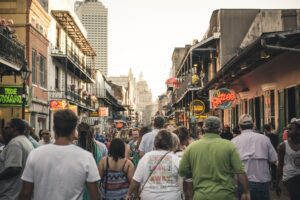What is Mindful Consumption
Whilst the term mindful and mindful consumption are not new terms, they having increased in recent years. More people these days have heard of the term “mindful” careful not to forget about something, or attentive, aware or careful yet they don’t necessarily associate it with consumption, the act of consuming a resource, or the act of buying and using things.
So mindful consumption is the practice of being aware and careful of consumption choices.
As we travel, our consumption choices are heightened, and we don’t often think too much of those particular choices when exploring new destinations, although each choice contributes to a range of other areas when travelling, leading onto how we Conserve and Protect our Natural Environment, Respect Cultures & Communities, Increase Animal Awareness and Eliminate Waste.
How we consume “things” include items such as deciding which mode of transport to take, where to each or buy a meal from, how much water we use, what activities we participate in, to name a few. All decisions lead onto actions that we may not initially be aware of without thinking too much, until we consider other aspects besides ourselves or how much something costs us.
Who, or what, does your purchase impact?
Mindful consumption is thinking of who or what is impacted by your purchase. Who is benefiting from your purchase, who receives the money at the end of the day, is the environment benefiting or suffering from your decision. It’s about taking longer to consider your options and making a more careful decision before making a snap decision, or acting out of habit like you’ve always done.
Why Care?
You may think who cares if I choose to opt to take a train or plane, or as long as I’m paying for a meal what does it matter if it’s from Macca’s or a local cafe. Each of these decisions indeed impacts someone, although it may not be always easy to recognise.
Adopting a mindful consumption is about changing your habits, with some answers being easier to answer than others.
Opting to board a plane verse a train for a short distance commute, may very well be better for your bank balance, although what impact to the environment does the flight have over taking a train? The truth is tourism is a large contributor to high greenhouse gas emissions caused by the aviation industry. With airline tickets offering reduced ticket prices, this has opening opportunities for more people to travel at a reduced cost, although means the higher travel demand the more flights airlines add, of course at a cheaper rate.
Tourism accounts for 8% of the worlds greenhouse gas emissions
Taking the mindful consumption view, goes past the impact of your bank balance, to what is the long term impact of my purchase. Is there a more ethical purchase I could make?
When it comes to food options, it might be convenient to purchase a burger from a well known fast food outlet because you know what to expect, or it’s cheap. although think past your hunger to ask yourself who is financially benefiting from this purchase? It will be the employees gaining a wage, then the corporate fast food outlet gaining in profits. With more profits, more outlets will be built for consumers. In lieu the alternative is to purchase a meal from a locally owned venue, that employees still gain a wage, but the business who is benefiting would be local communities who have created a business and will reinvest in the business to ensure it remains open for others.
What would you prefer to see in cities or towns, well known fast food outlets side by side, or unique locally owned and operated cafes and restaurants, that offer local cuisines and culture.
Your choices today impact future travellers like yourself
How can I Help?
The first step of mindful consumption is to
Gather options, then take time to decide
To guide people on their impact to communities, the environment and animals, start to consider others when travelling, not purely yourself, your convince, your bank balance. This starts when you begin to plan your trip, not purely when you’re away.
It could mean more planning up front for your trip, choosing an alternative transportation method, even though it will mean your trip is longer in time. Consider using carbon emission calculators to determine your impact to the environment. As a rough guide, the global average carbon emissions per person is 4.8 tonnes (based on 2017 data). How does your trip compare? What conscious efforts can you make to reduce it?
https://co2.myclimate.org/en/offset_further_emissions
https://www.carbonfootprint.com/calculator.aspx
It could mean for meal options, walking to the second block of streets off the main busy touristy strip. Then find a restaurant that is busy with locals instead of tourists, mingling and meeting locals, trying authentic meals and drinks.
Along with meal venue options, comes mindful ordering. Being aware of how much food you actually require to fill your hunger, instead of ordering a massive meal then throwing half a plate of food waste away as you’re too full. Try ordering smaller meals of a variety of dishes than larger plates, and opt for sharing dishes with travel companions where possible to reduce food waste.
It may require changes in your living standards when travelling, do you opt for a well known accomodation property, or a locally owned hostel or hotel. Your accomodation funds can benefit large corporate property groups, or a local family business who’ve built accommodation in a unique location or local style. Whilst staying at multi storey hotel chain may suit a particular standard, staying at some quirky properties provide great stories to tell, plus usually have other unique qualities about them.
A great start for accommodation property options, is to stay 25% at locally owned properties for your next trip, then increase to 40% on your next trip, and so on.
Once you open your mind to who benefits (or who is impacted) after your purchase, the journey begins to sustainable travel, for your life now and your future generations who want to travel just like you.
Being more conscious of your trips, how long you travel for, the modes of transportation you take, how often you travel and overall how you can travel with more awareness to ensure a sustainable and healthy planet.






